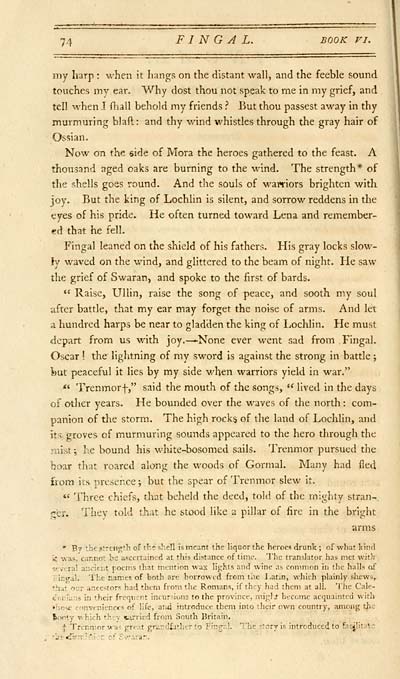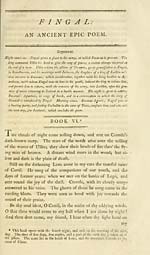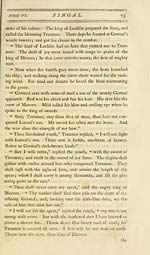Download files
Complete book:
Individual page:
Thumbnail gallery: Grid view | List view

74 F I N G A L. book vi.
my harp : when it hangs on the distant wall, and the feeble sound
touches my ear. Why dost thou not speak to me in my grief, and
tell when I fliall behold my friends ? But thou passest away in thy
murmuring blaft: and thy wind whistles through the gray hair of
Ossian.
Now on the side of Mora the heroes gathered to the feast. A
thousand aged oaks are burning to the wind. The strength* of
the shells goes round. And the souls of wawiors brighten with
joy. But the king of Lochlin is silent, and sorrow reddens in the
eyes of his pride. He often turned toward Lena and remember-
ed that he fell.
Fingal leaned on the shield of his fathers. His gray locks slow-
ly waved on the wind, and glittered to the beam of night. He saw
the grief of Swaran, and spoke to the first of bards.
" Raise, Ullin, raise the song of peace, and sooth my soul
after battle, that my ear may forget the noise of arms. And let
a hundred harps be near to gladden the king of LochHn. He must
depart from us with joy.— None ever went sad from Fingal.
Oscar ! the lightning of my sword is against the strong in battle j
but peaceful it lies by my side when warriors yield in war."
** Trenmorf ," said the mouth of the songs, " lived in the days
of other years. He bounded over the waves of the north : com-
panion of the storm. The high rocks of the land of Lochlin, and
its groves of murmuring sounds appeared to the hero through the
mist •, he bound his white-bosomed sails. Trenmor pursued the
boar that roared along the woods of Gornial. Many had fled
&om its presence •, but the spear of Trenmor slew it.
« Three chiefs, that beheld the deed, told of the mighty stran-
<:cr. Thev told that he stood like a pillar of fire in the bright
arms
* Bv the strcngtli of the shell is meant the liquor the heroes drunk ; of what kind
I: ".vas.'car-uot bs ascertained at tliis distance of time. The translator has met with
^■e vera! ancient poems that mention wax lights and wine as common in the halls of
Fingal. The names of both are borrowed from the I,atin, which plainly sliews^
rhut our ancestors had them from the Romans, if they had them at all. The Cale-
•ifii'-ians in their freqvfnt incursions to the province, migli become acquainted with
*fiose conveniences of life, atid introduce them into their o^vn country, among tjie
tooty which thty carried from South Britain,
f Trenn-.or wa'^ great grandfather to Fin.fjrJ. The ?;or-/ is introduced to faejiita^c^
-Jt^ifrnl^ior: of S^^arar.
my harp : when it hangs on the distant wall, and the feeble sound
touches my ear. Why dost thou not speak to me in my grief, and
tell when I fliall behold my friends ? But thou passest away in thy
murmuring blaft: and thy wind whistles through the gray hair of
Ossian.
Now on the side of Mora the heroes gathered to the feast. A
thousand aged oaks are burning to the wind. The strength* of
the shells goes round. And the souls of wawiors brighten with
joy. But the king of Lochlin is silent, and sorrow reddens in the
eyes of his pride. He often turned toward Lena and remember-
ed that he fell.
Fingal leaned on the shield of his fathers. His gray locks slow-
ly waved on the wind, and glittered to the beam of night. He saw
the grief of Swaran, and spoke to the first of bards.
" Raise, Ullin, raise the song of peace, and sooth my soul
after battle, that my ear may forget the noise of arms. And let
a hundred harps be near to gladden the king of LochHn. He must
depart from us with joy.— None ever went sad from Fingal.
Oscar ! the lightning of my sword is against the strong in battle j
but peaceful it lies by my side when warriors yield in war."
** Trenmorf ," said the mouth of the songs, " lived in the days
of other years. He bounded over the waves of the north : com-
panion of the storm. The high rocks of the land of Lochlin, and
its groves of murmuring sounds appeared to the hero through the
mist •, he bound his white-bosomed sails. Trenmor pursued the
boar that roared along the woods of Gornial. Many had fled
&om its presence •, but the spear of Trenmor slew it.
« Three chiefs, that beheld the deed, told of the mighty stran-
<:cr. Thev told that he stood like a pillar of fire in the bright
arms
* Bv the strcngtli of the shell is meant the liquor the heroes drunk ; of what kind
I: ".vas.'car-uot bs ascertained at tliis distance of time. The translator has met with
^■e vera! ancient poems that mention wax lights and wine as common in the halls of
Fingal. The names of both are borrowed from the I,atin, which plainly sliews^
rhut our ancestors had them from the Romans, if they had them at all. The Cale-
•ifii'-ians in their freqvfnt incursions to the province, migli become acquainted with
*fiose conveniences of life, atid introduce them into their o^vn country, among tjie
tooty which thty carried from South Britain,
f Trenn-.or wa'^ great grandfather to Fin.fjrJ. The ?;or-/ is introduced to faejiita^c^
-Jt^ifrnl^ior: of S^^arar.
Set display mode to: Large image | Transcription
Images and transcriptions on this page, including medium image downloads, may be used under the Creative Commons Attribution 4.0 International Licence unless otherwise stated. ![]()
| Early Gaelic Book Collections > Ossian Collection > Poems of Ossian, the son of Fingal > (86) |
|---|
| Permanent URL | https://digital.nls.uk/77923357 |
|---|
| Description | Selected books from the Ossian Collection of 327 volumes, originally assembled by J. Norman Methven of Perth. Different editions and translations of James MacPherson's epic poem 'Ossian', some with a map of the 'Kingdom of Connor'. Also secondary material relating to Ossianic poetry and the Ossian controversy. |
|---|
| Description | Selected items from five 'Special and Named Printed Collections'. Includes books in Gaelic and other Celtic languages, works about the Gaels, their languages, literature, culture and history. |
|---|

